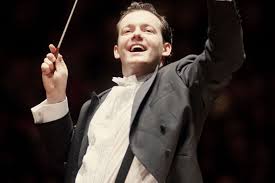Birmingham Symphony Hall, 17 May 2015
Andris Nelsons may be leaving CBSO soon but he is going out with a flurry of wonderful performances, none less surely than this Parsifal. He brings a dramatic urgency to the score which maintains a level of unexpected tension throughout. Where complaints are often made about long dull narrations, here every word has impact, particularly in the capable hands of Georg Zeppenfeld’s youthful Gurnemanz. We were encouraged to hear the dialogue as if for the first time and when this is added to the freshness and clarity of the orchestration it was frequently revelatory. Not that the evening seemed rushed. If anything the Grail scenes themselves, the moments of revelation, acquired a genuinely timeless quality in contrast to the angst of the earlier scenes.
To the outstanding playing of the CBSO can be added Simon Halsey’s choral direction for the CBSO Chorus. Where opera companies often need to double the chorus to make an impact there was no problem here in the cutting edge of the men as they assault Amfortas for failing to reveal the Grail or the horror of their gasp at Titurel’s body. The lower women’s chorus was placed on stage with the upper chorus in the top gallery, adding a clarity and immediacy to the sound. The flower maidens were as good as I have ever heard them in fifty years. (I heard my first Parsifal in Bayreuth in 1965!)
Soloists were all outstanding, with lyrical qualities to the fore, and legato lines one would expect of Verdi rather than Wagner. Burkhard Fritz has the stamina for Parsifal and a nobility of presence which carries him through. There was a wonderful moment at the end of Act One. As he was dismissed by Gurnemanz he stopped as he heard the Alto voice from above and turned towards it. He was aware, at last, of his destiny which makes sense then of his demands to be crowned in Act Three. I don’t recall ever seeing this done on stage.
Mihoko Fujimura has reserves of energy which allow her to colour the voice to meet the dramatic needs of Kundry, deep and pained in act one but seemingly lighter and more seductive in the early scenes of act two. It was a pity that she had a habit of fidgeting with her score when not singing which was slightly distracting.
James Rutherford was an unusually youthful Amfortas which again makes the whole question of his seduction more credible and he brought real pain to both of his narrations. Paul Whelan’s Titurel, sung from the organ gallery, added to the intense gloom of the opening of the Grail scene.
There was a standing ovation at the end and while I am never quite happy with the practise I fully understood it on this occasion. Even at a time of many great Wagner performances which we are privileged to attend this was outstanding.

